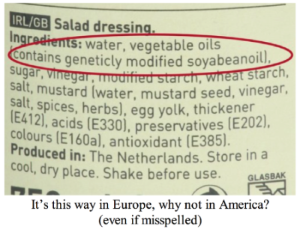GMO Labeling Laws Ditched: The Passage of the DARK Act Shows the Arrogance of US Politicians

On July 23, 2015, the United States House of Representatives voted upon and passed (by a 275-150 majority) H.R. 1599, the so-called “Safe and Accurate Food Labeling Act of 2015,” otherwise known as the DARK Act.
The DARK Act is a more accurate description of the bill – which must now be taken up by the Senate – as the acronym “Deny Americans the Right to Know” more aptly tells us what Congress is doing here: Negating all existing and future GMO labeling laws at State and local levels so that consumers will not be able to make an informed choice as well as eliminating numerous non-Federal laws regulating genetically engineered crops.
In particular, the DARK Act – if passed by the Senate and signed into law by Obama – will:
- Preempt State and local laws regarding the production and sale of GMO crops, not just the labeling of GMO foods;
- Eliminate “GMO-Free” zones;
- Unfairly burden traditional farmers and food producers to label their food as “GMO-free,” requiring certification from the pro-GMO USDA;
- Further muddy the food definition of “Natural,” allowing companies to make “natural” claims on packaging even if the food contains GMOs; and
- Allow dairy products from animals fed bioengineered foods and foods developed using bioengineered processing aids or enzymes to still be labeled as non-bioengineered.
Although touted as a means of ending a “confusing patchwork” of GMO labeling laws, the DARK Act is really nothing more than camouflage for the removal of Americans’ right to know what is in their food and drink. The Act ends the “confusing patchwork” in the same way that Attila the Hun ended the “confusing patchwork” of tribes in his sweeping path: He just annihilated them. We need real GMO labeling so that we can all make informed food choices.
The many Republicans and few Democrats who voted for this Act should be ashamed, while the many Democrats and few Republicans who voted against it are to be commended. It was the triumph of moneyed interests over the wishes of the voters. More than 90% of Americans have demanded mandatory GMO labeling, as shown by every substantial poll taken. Even Republican voters have expressed an 89% support for mandatory labeling. Yet, Congress – including my long-time friend Rep. Dana Rohrabacher (R-CA), who voted for the bill – has ignored this overwhelming support for clear GMO labels. Ironically enough, many of NHF’s long-time health-freedom opponents in Congress voted on the right side of this issue. (See https://www.govtrack.us/congress/votes/114-2015/h462)
The U.S. Senate is the next battleground here. Senator John Hoeven (R-ND) is preparing his own GMO labeling bill, which appears to be no improvement over the House version. Still, the Senate will consider the DARK Act or Senator Hoeven’s bill, or even perhaps another, more consumer-friendly bill in the near future. It is up to us to make this happen as you can be sure that the GMO industry (Monsanto) will not be idle in peddling its influence into the darkest corners of Capitol Hill.
Our very health is at stake. As Robert Cohen (one of NHF’s resident experts on GMO foods and their health dangers) recently observed, “The September 2015 issue of Chemosphere (pages 135:53-60) includes a study just in time for Monsanto-paid reviewers: ‘Roundup exposure promotes gills and liver impairments, DNA damage and inhibition of brain cholinergic activity in the Amazon teleost fish Colossoma macropomum’ [where] researchers found: ‘Our findings show that biomarkers in tambaqui are organ specific and dependent on (Roundup) concentration.
Alterations in gills structural and respiratory epithelium were followed by changes in hematological parameters such as concentration of hemoglobin…In addition, (Roundup) concentrations affected the biotransformation process in gills of tambaqui negatively. Instead, liver responses suggest that a production of reactive oxygen species (ROS) occurred in fish exposed (to Roundup), as seen by imbalances in biotransformation and antioxidant systems. The increased DNA damage observed in red blood cells of tambaqui exposed (to Roundup) is in agreement with this hypothesis.’ Marine scientists concluded: ‘Thus, we can suggest that (Roundup) is potentially toxic to tambaqui and possibly to other tropical fish species.’ (emphasis added) Today’s information might be twisted by paid Monsanto deceivers. Truth is painful. The truth hurts. Through their well-paid spokesmen, Monsanto continues to ignore that the facts are the facts.”
The NHF just returned from Geneva, Switzerland where we helped to defeat Codex Alimentarius’ adoption of a standard for a genetically modified bovine growth hormone. We need your help to defeat this home-grown threat to our health. What poisons the World cannot help but poison us. As at Codex, let’s defeat this latest threat. Your active participation is vital for NHF’s continued work against the Food Giants. Please visit: http://www.thenhf.com/donations-historical/ to make your support known today.

